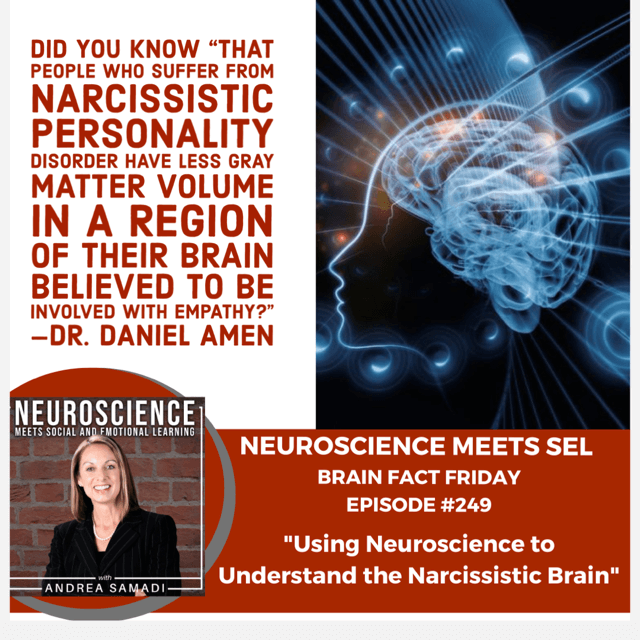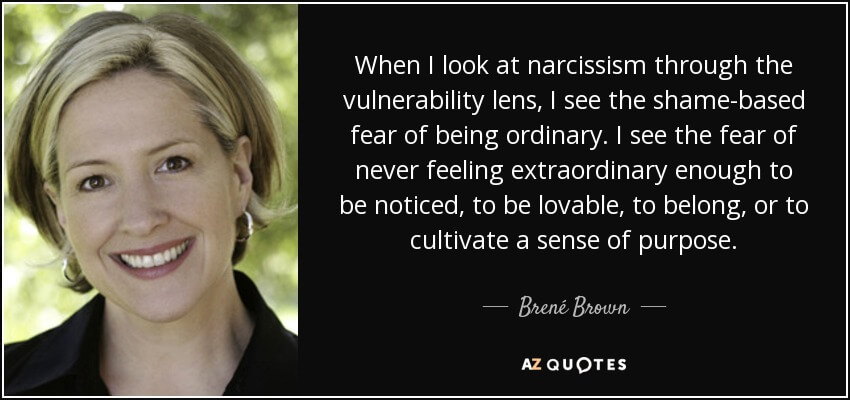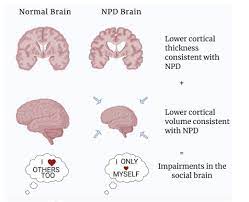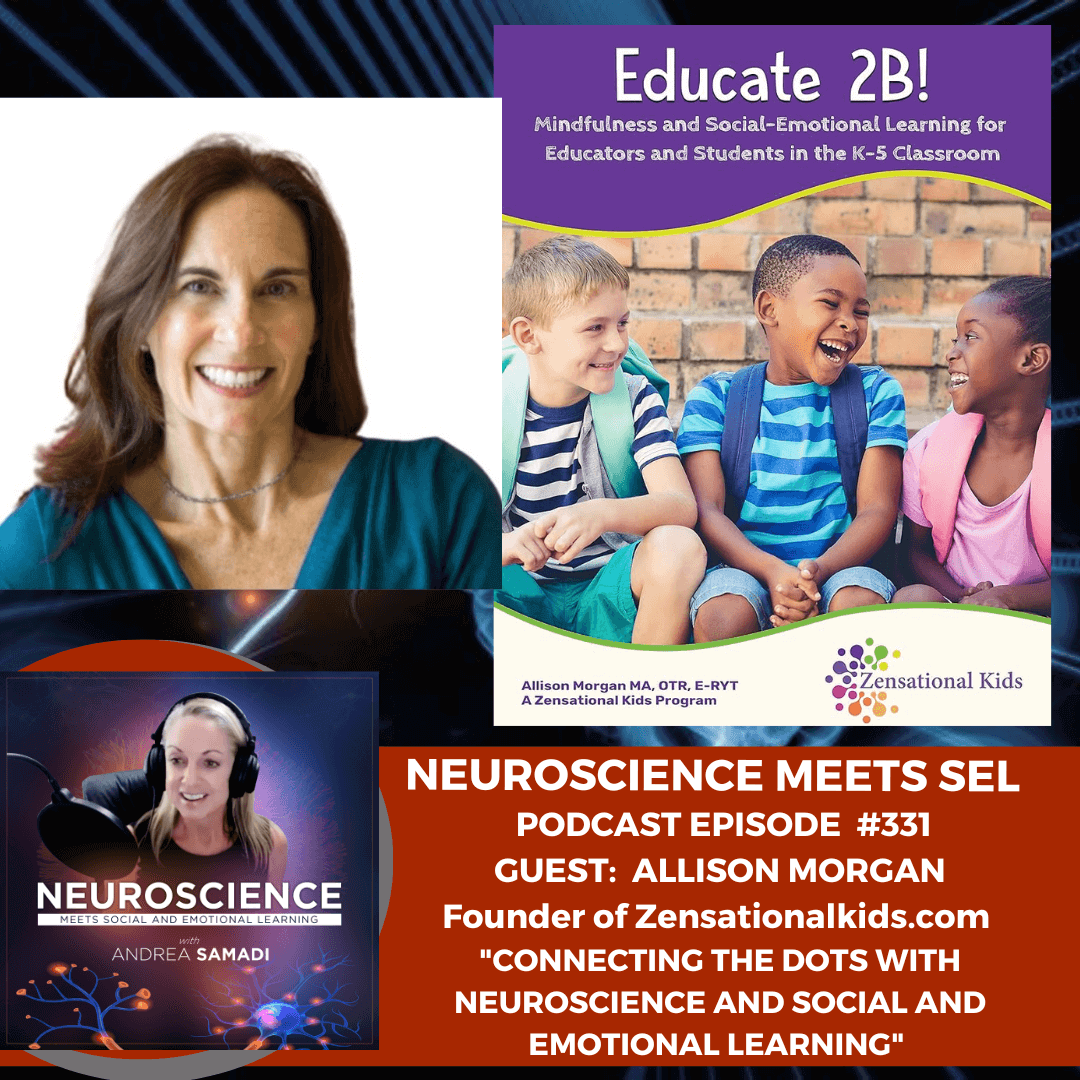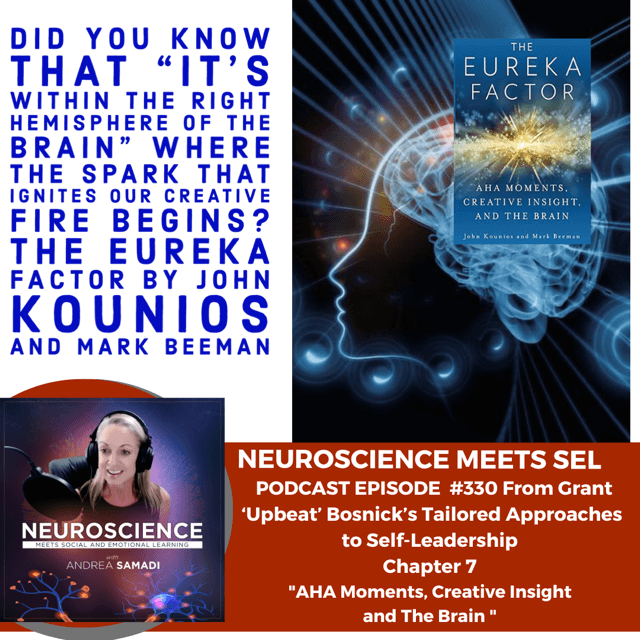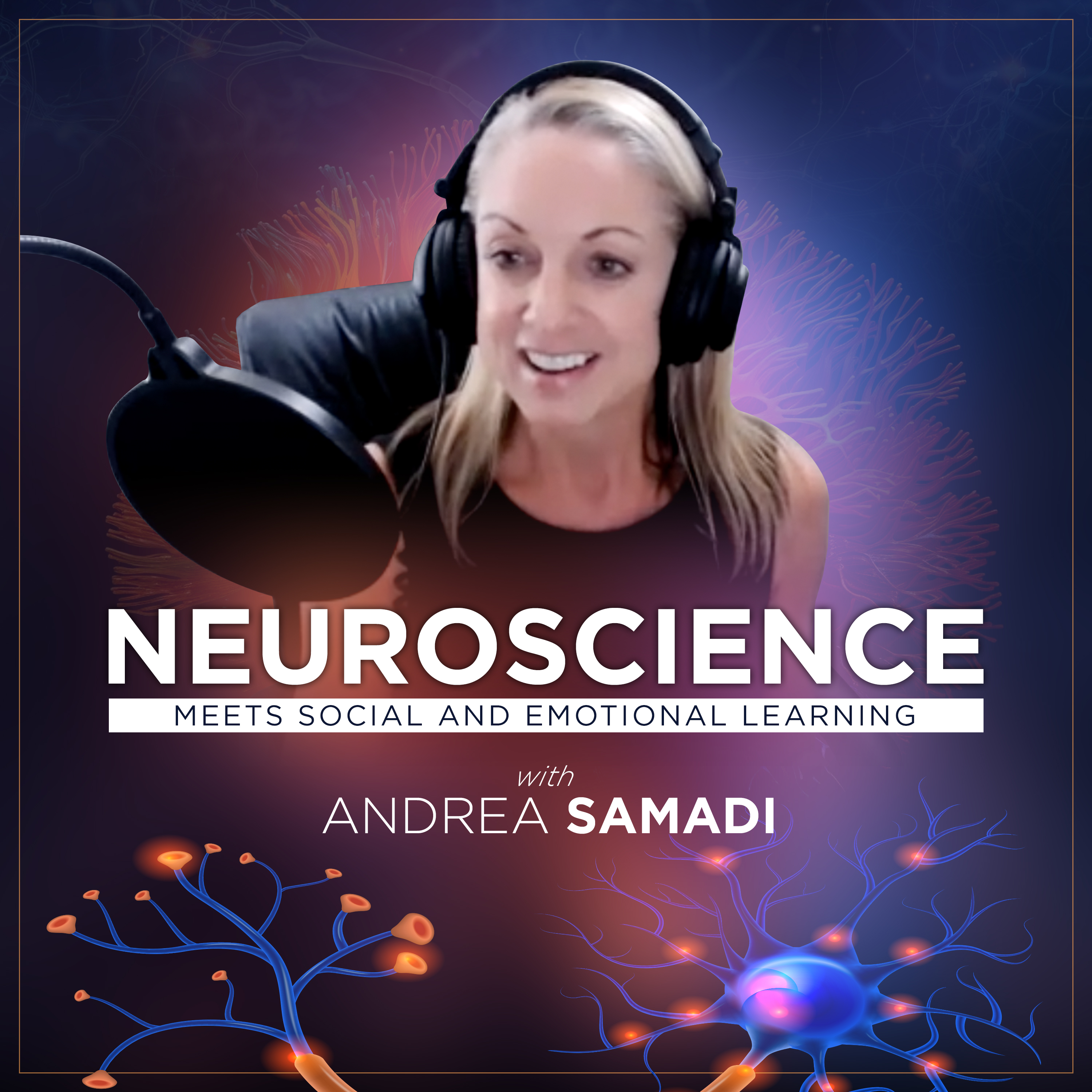“When I look at narcissism through the vulnerability lens, I see the shame-based fear of being ordinary. I see the fear of never feeling extraordinary enough to be noticed, to be loveable, to belong, or to cultivate a sense of purpose.” Brené Brown.
And when I look at narcissism through the vulnerability lens, I see the spirit in that person, desperately trying to be seen for their talents, skills and abilities, but something keeps this person’s spirit in the shadows and I wonder what that is.
On today’s episode we will examine:
✔ Narcissism through the vulnerability lens
✔ What is narcissism and how is it diagnosed.
✔ What the narcissistic brain looks like.
✔ 3 STEPS to move you forward if you think you are a narcissist, if you live with one, or if you work with one.
Welcome back to The Neuroscience Meets Social and Emotional Learning Podcast where we bridge the gap between theory and practice, with strategies, tools and ideas we can all use immediately, applied to the most current brain research to heighten productivity in our schools, sports environments and modern workplaces. I’m Andrea Samadi and launched this podcast to share how important an understanding of our brain is for our everyday life and results.
For this week’s Brain Fact Friday, I want to look at something I saw this past week about the narcissistic brain. We hear this word so often these days, thrown around when describing someone who is self-centered, someone who is unlikeable when they exclaim, “That person is such a narcissist!”
Narcissistic personality disorder (NPD) is “a condition where people have an inflated sense of self-importance and a deep-seated need for attention and admiration. Those living with NPD show a distinct lack of empathy for the feelings and needs of others.”[i]
In writing this episode, I want to come from the “vulnerable” angle (like Brené Brown mentioned in her quote) and look at what we can learn about the brain of someone who meets at least 5 of the criteria for what we call narcissistic personality disorder.[ii] My goal with this episode is to help all of us to understand the “why” behind narcissism, a personality disorder that is not difficult to miss when you either work with, or live with someone who shows even a few of the criteria that’s needed for a clinical diagnosis.
American psychologist, and brain disorder specialist, Dr. Daniel Amen, from Amen Clinics, says that “6.2% of the American population has a narcissistic personality disorder” that often begins in early adulthood.
What’s interesting, is that “Psychologically speaking, narcissism is a personality trait that every person possesses to some degree. Like any characteristic, it exists on a spectrum. We all fall somewhere along the narcissistic continuum” and a certain amount of self-centeredness is healthy.”[iii]
While writing this episode, I remembered something sleep medicine physician, and sports psychiatrist Dr. Shane Creado from EP #72[iv] said to me when he analyzed my brain scan from Amen Clinics, and I went back to that episode #84[v] to look at what he saw. I remember he said something about my deep limbic system being the brightest part of my emotional brain and that he saw this area overactive in people who hold themselves to high standards. I wondered for a minute. Oh no, does this make me a narcissist? Curious, I sent him a text late last night to double check what he meant by that and he sent me a wonderful explanation this morning, affirming that narcissism is complex, and operates on a spectrum. He explained why we all need a certain amount of it, to be focused on our goals, or things that we want to achieve, which explained why he saw this area light up brightly with people who are perfectionists, like I tend to be with this podcast.
When releasing content out to the world, I have to be careful of what I say, and how I say it, especially when I’m interviewing someone, and what I create goes into the world for anyone to watch, and will become a reflection of that person from that moment on. I’m incredibly picky with how I produce my video interviews, (and will probably never outsource them) as I want to highlight that person in a certain way–in the brightest light possible, not just for that minute, but for the rest of their lifetime that the video is online, representing them. Thank goodness that the perfectionist in me doesn’t make me a narcissist, according to Dr. Creado, as this would be expected of anyone who wants to do their best on anything (a test, an interview, or whatever it is they are working on).
Where he cautioned me, was that if for some reason something doesn’t meet my high expectations, to watch that I don’t go down the path of self-doubt, shame, or guilt which would lead to depression. He reminded me that this topic is complex, and to be careful of taking a brain scan that “looks” a certain way, and then label of person because of it. He recommended credible personality testing to diagnose someone with a personality disorder, like the Minnesota Multi-Phasic Personality Inventory (MMPI)[vi] that is one of the most researched psychological tests in existence. He did say this topic was complex, and I’m starting to see why.
So for this episode, I want to stay on the surface of this complex brain disorder, to see if we can improve our own awareness of the narcissistic brain—what the research sees in a brain with someone who has been diagnosed with this personality disorder, and what can we learn from this. Dr. Amen, from Amen Clinics[vii] where I had my brain scanned, has a section for understanding personality disorders on his website[viii], and notes that Narcissistic Personality Disorder is characterized by “an inflated sense of self-importance, an excessive need for admiration, and a lack of empathy.”
He lists symptoms that include:
- An exaggerated sense of self-importance
- A need for excessive and constant admiration
- A lack of empathy
- Being preoccupied with grandiose fantasies of unlimited success, money, or power
- A need to be recognized as superior or special and a belief that they can only keep company with people of equal exceptionalism
- A sense of entitlement to special treatment
- A tendency to exaggerate accomplishments or talents
- Manipulation or exploitation of others
- A belief that others are envious of them, while deep down being envious of others
- An arrogant, haughty, or demanding attitude
While this topic is complex, as Dr. Creado shared, there are many books that one can read to learn more about the different types of personality disorders that are on a spectrum, meaning that not all types are the same, for today’s Brain Fact Friday, I want to focus on a trait that is common to all types of narcissism, and that is that they lack empathy. When I saw this, my need to understand “why” came to my mind, as I thought, “why do some people not care about others?”
Which leads us to this week’s Brain Fact Friday where we can gain tremendous understanding with questions just like this, when we look at why people behave the way they do, and connect it, to the most current brain research.
DID YOU KNOW “that people who suffer from narcissistic personality disorder have less gray matter volume[ix] in a region of their brain believed to be involved with empathy”[x] and they also have “increased activity in baseline images in brain regions associated with self-directed and self-absorbed thinking.” Dr. Daniel Amen.
In the show notes I put an image of an fMRI scan that reveals the lower cortical thickness in the NPD brain vs a normal brain, as well as lower cortical volume, which explains why someone who has been diagnosed with this disorder would show impairments in the social brain.
WHY DO NARCISSISTS LACK EMPATHY?
It’s starting to make more sense to me now, almost like an AHA moment. When someone says “I don’t care” they really do mean it.
A closer look at the narcissistic brain can explain why.
SO NOW WHAT?
Dr. Amen, who has been on a mission to help people improve their health since he began looking at the brain back in 1991, now adds in a recent Instagram post with international DJ, producer and neuroscience fan, Steve Aoki[xi], that he’s on a mission to make brain health cool, and his clinic is where anyone can go to find answers. He states that what makes personality disorders complex is that “many environmental factors can impact brain function and lead to symptoms of mental illness” and he shares that he has seen “how environmental toxins (such as toxic mold) infections like Lyme Disease, extremely low thyroid, anemia, anoxia (lack of oxygen) and even chemotherapy can alter brain function and contribute to changes in someone’s personality.”[xii] Like Dr. Creado mentioned, since there are so many factors at play, it’s very important to investigate this disorder with someone who can perform a comprehensive evaluation that includes brain imaging, lab testing, and other assessments, and that we don’t jump to conclusions, and label someone as “bad” with this disorder. Looking at any disorder with the brain in mind puts a whole new perspective on our brain health, as we look to see beyond the behavior to what could be at the root of the problem.
Since I’m not a doctor, and a clinical diagnosis of this personality disorder is needed, the goal of this episode is to bring awareness to help all of us understand others that might show signs of this brain disorder whether it’s someone you work with, live with, interact with, or even (gasp) in ourselves.
- How can we use this new understanding of the narcissistic brain to help us?
Go back and look at the list of symptoms that are present in this disorder, and see if there is someone in your life that is making your life challenging in some way, with this trait.
- An exaggerated sense of self-importance
- A need for excessive and constant admiration
- A lack of empathy
- Being preoccupied with grandiose fantasies of unlimited success, money, or power
- A need to be recognized as superior or special and a belief that they can only keep company with people of equal exceptionalism
- A sense of entitlement to special treatment
- A tendency to exaggerate accomplishments or talents
- Manipulation or exploitation of others
- A belief that others are envious of them, while deep down being envious of others
- An arrogant, haughty, or demanding attitude
What can we do next?
1: BECOME CURIOUS TO LEARN MORE: KNOWLEDGE IS POWER
Use this new understanding of the narcissistic brain to learn more. As you gain more awareness, you also gain more confidence with how to deal with challenging or high conflict people in your home or work life. I could list all the books I have found, but jut type narcissism into Amazon, and you will find hundreds of books to help guide you to understand:
- What is narcissism
- What causes it
- How it’s diagnosed
- Different types
- How to move beyond the damage
2: THINK WITH YOUR BRAIN HEALTH IN MIND: Even someone like high performance author and expert Brendon Burchard[xiii] noted that after an ATV accident, his personality changed dramatically, and he went straight to Amen Clinics to look for the reason behind the personality change, with his brain health in mind. The key is to look for what might be at the root of the personality change and not to rule out accidents, injuries, or environmental factors. When we look at our health with our brain in mind, we also look at the supplements we can take, or what else we can do to improve our health, outside of taking medication that’s often prescribed for someone when they don’t need it.
3: USE THE CURRENT RESEARCH TO BACK-CAST YOUR LIFE: Once you begin to look at something you want to learn more about (like this topic-The Narcissistic Brain) go deeper into the research to see what this could mean for you in the future. As I began to research the narcissistic brain, I started to learn that someone with this disorder is at higher risk for dementia.[xiv] If I had someone in my life that were showing signs of this disorder, I would be using the technique I learned from Peter Attia[xv] calls back casting, and think about what we want our life to be like as we age. I would also begin to research this topic from as many of the experts like Dr. Ramani[xvi], to see what other people in similar situations have gone through.
To review this week’s Brain Fact Friday,
DID YOU KNOW “that people who suffer from narcissistic personality disorder have less gray matter volume[xvii] in a region of their brain believed to be involved with empathy”[xviii] (Dr. Amen) and they also have “increased activity in baseline images in brain regions associated with self-directed and self-absorbed thinking.”
In this episode we looked at why someone with this disorder lacks empathy, with what science reveals with brain scan technology and my hope is not to label or shame someone who fits the wide spectrum of narcissism, but to open up our awareness and use this new understanding of The Narcissistic Brain to show us this issue is “biological, not moral” (Dr. Amen) and with this new understanding, help us to find new ways to move forward, and create more balance, peace and equilibrium in our everyday life.
This episode was created to help us to see why some people behave the way they do. Like Brene Brown said, this doesn’t make us naïve, but allows us to look past what some would call “bad behavior” and see the spirit or soul in every person. She reminds us–When we look at narcissism through the vulnerability lens, we see the shame-based fear of being ordinary or the fear of never feeling extraordinary enough to be noticed, to be loveable, to belong, which we can all understand on some level.
I hope this episode has helped you to see Narcissism in a new light, like it did for me, so we can all keep learning, and looking for the latest research to inform our decisions, thinking with brain health in mind.
I’ll see you next week.
RESOURCES:
What’s Going on in a Narcissistic Brain? https://writemindmatters.medium.com/whats-going-on-in-a-narcissistic-brain-4ea5331b2696
Narcissists Lack of Empathy Detected on Brain Scans by Denise Chow June 24, 2013 https://www.livescience.com/37684-narcissistic-personality-disorder-brain-structure.html
REFERENCES:
[i] The Neuroscience of Narcissism Published June 13, 2020 https://www.learnaboutdid.com/2020/06/13/the-neuroscience-of-narcissism/
[ii] Dr. Amen 5 Signs You Are in a Relationship with a Narcissist Oct. 16, 2019 https://www.amenclinics.com/blog/5-signs-youre-in-a-relationship-with-a-narcissist/
[iii] I’m a professor of human behavior and I have some news about the narcissist in your life by Melody Wilding, Published Nov. 14, 2018 https://www.businessinsider.com/narcissism-vs-narcissist-2018-11#:~:text=Psychologically%20speaking%2C%20narcissism%20is%20a,of%20self%2Dcenteredness%20is%20healthy.
[iv]Neuroscience Meets Social and Emotional Learning Podcast EPISODE #72 with Dr. Shane Creado on “Sleep Strategies That Will Guarantee a Competitive Advantage” https://andreasamadi.podbean.com/e/dr-shane-creado-on-sleep-strategies-that-will-guarantee-a-competitive-advantage/
[v] Neuroscience Meets Social and Emotional Learning Podcast EPISODE #84 on “PART 3: How a Spect Scan Can Change Your Life” https://andreasamadi.podbean.com/e/how-a-spect-scan-can-change-your-life-part-3-with-andrea-samadi/
[vi] The Minnesota Multiphasic Personality Inventory (MMPI) by Kendra Cherry Sept. 02, 2021 https://www.verywellmind.com/what-is-the-minnesota-multiphasic-personality-inventory-2795582
[viii] https://www.amenclinics.com/conditions/personality-disorders/
[ix] Gray matter abnormalities in patients with narcissistic personality disorder Published October, 2013 https://pubmed.ncbi.nlm.nih.gov/23777939/
[x] Dr. Amen 5 Signs You Are in a Relationship with a Narcissist Oct. 16, 2019 https://www.amenclinics.com/blog/5-signs-youre-in-a-relationship-with-a-narcissist/
[xi] Dr. Amen with International DJ Steve Aoki https://www.instagram.com/p/Ci_k8NhLrYN/?hl=en
[xii] Narcissistic Personality Disorder by Dr. Daniel Amen https://www.amenclinics.com/conditions/narcissistic-personality-disorder/
[xiii] What Brendon Burchard learned about 2 brain traumas https://www.instagram.com/p/BjP5NKFBawh/?hl=en
[xiv] From narcissistic personality disorder to frontotemporal dementia: a case report published by Michelle Poletti, 2011 https://pubmed.ncbi.nlm.nih.gov/21606578/
[xv] Peter Attita https://twitter.com/PeterAttiaMD/status/1529823436196835329
[xvi] Narcissistic Relationships and Dementia Dr. Ramani Published May 13, 2021 https://www.youtube.com/watch?v=KJMzDBJssGA
[xvii] Gray matter abnormalities in patients with narcissistic personality disorder Published October, 2013 https://pubmed.ncbi.nlm.nih.gov/23777939/
[xviii] Dr. Amen 5 Signs You Are in a Relationship with a Narcissist Oct. 16, 2019 https://www.amenclinics.com/blog/5-signs-youre-in-a-relationship-with-a-narcissist/
Podcast: Play in new window | Download
Subscribe: Apple Podcasts | RSS





